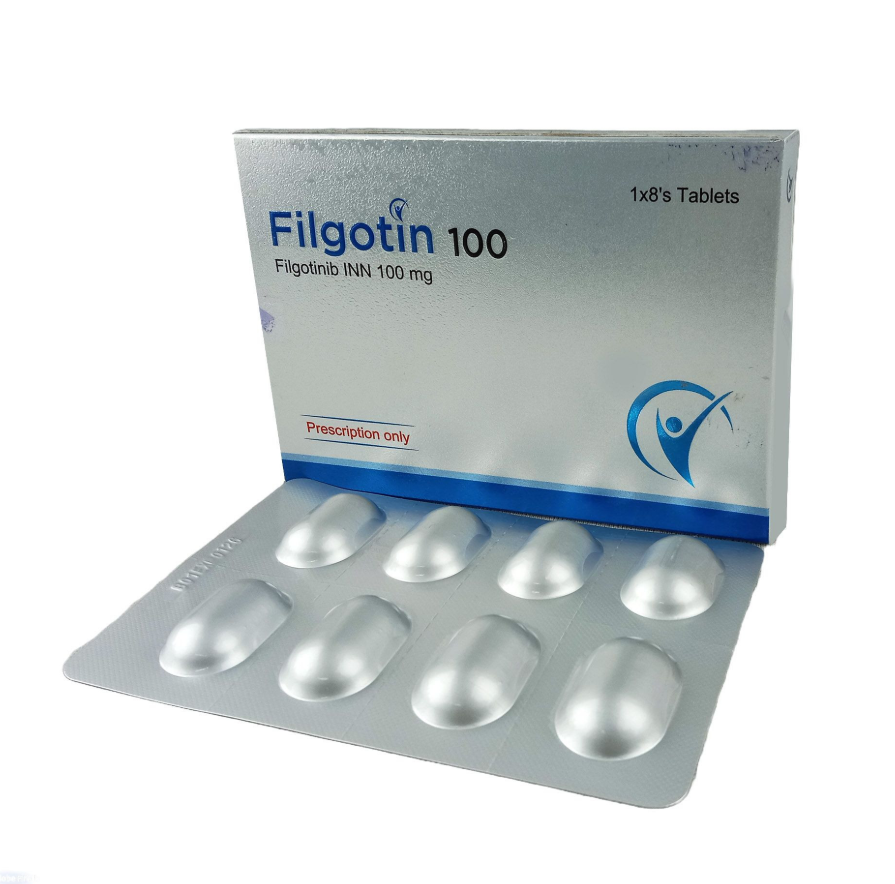Bonaid 150mg
৳ 1,500.00Filgotin 100
৳ 2,200.00
1 Ps
- Type: Tablet - (100mg)
Description
Indications
Rheumatoid Arthritis: Filgotinib is indicated for the treatment of moderate to severe active rheumatoid arthritis in adult patients who have not adequately responded to, or are intolerant of, one or more disease-modifying anti-rheumatic drugs (DMARDs). It may be used either as a monotherapy or in combination with methotrexate (MTX).
Ulcerative Colitis: Filgotinib is indicated for adults with moderately to severely active ulcerative colitis who have either had an inadequate response to, lost response to, or were intolerant of conventional therapy or biologic agents.
Note: Follow the advice of a registered physician when using this medication.
Pharmacology
Filgotinib acts as a reversible and adenosine triphosphate (ATP)-competitive inhibitor of the Janus kinase (JAK) family. JAKs are intracellular enzymes that transmit signals originating from cytokine or growth factor receptor interactions on the cellular membrane. JAK1 is primarily involved in mediating inflammatory cytokine signals, JAK2 plays a role in myelopoiesis and erythropoiesis, and JAK3 is crucial for immune homeostasis and lymphopoiesis. In this signaling pathway, JAKs phosphorylate and activate signal transducers and activators of transcription (STATs), which regulate various intracellular activities including gene expression. Filgotinib works by inhibiting the phosphorylation and activation of STATs. In laboratory studies, filgotinib was found to preferentially inhibit JAK1, exhibiting more than five times greater potency against JAK1 compared to JAK2, JAK3, and TYK2.
Dosage & Administration
Rheumatoid Arthritis: The recommended dose is one 200 mg tablet daily.
Ulcerative Colitis: The recommended dose is 200 mg once daily. If there is no significant therapeutic response after 22 weeks of treatment, filgotinib should be discontinued.
For adults at higher risk of venous thromboembolism, major cardiovascular events, or malignancy, the recommended maintenance dose is 100 mg daily. In case of disease flare, the dosage may be increased to 200 mg once daily. For long-term treatment, the lowest effective dose should be used.
Note: Follow the advice of a registered physician when using this medication.
Interaction
Effect of Other Medicinal Products on Filgotinib: Filgotinib is primarily metabolized by carboxylesterase 2 (CES2), which can be inhibited by certain medications, such as fenofibrate, carvedilol, diltiazem, or simvastatin. The clinical significance of these interactions is not fully understood.
Effect of Filgotinib on Other Medicinal Products: Filgotinib is not a clinically significant inhibitor or inducer of common enzymes or transporters involved in drug interactions, such as cytochrome P450 (CYP) enzymes or UDP-glucuronosyltransferases (UGT).
Contraindications
- Hypersensitivity to filgotinib or any of its components
- Active tuberculosis (TB) or severe active infections
- Pregnancy
Side Effects
Common side effects may include nausea, upper respiratory tract infections (URTI), urinary tract infections (UTI), and dizziness.
Pregnancy & Lactation
Use in Pregnancy: There is limited data regarding the use of filgotinib during pregnancy. Animal studies have shown reproductive toxicity, and based on these findings, filgotinib is contraindicated during pregnancy due to the potential for fetal harm.
Women of Childbearing Potential / Contraception: Women who may become pregnant should use effective contraception during treatment and for at least one week after stopping filgotinib.
Lactation: It is unknown whether filgotinib is excreted in human milk, and there is a potential risk to breastfeeding infants. Therefore, filgotinib should not be used during breastfeeding.
Precautions & Warnings
- Immunosuppressive Medications: Combining filgotinib with other potent immunosuppressants (e.g., azathioprine, ciclosporin, tacrolimus, biologic DMARDs, or other JAK inhibitors) is not recommended due to the risk of additive immunosuppression.
- Infections: Serious infections, including pneumonia, have been reported with filgotinib. Opportunistic infections such as TB, esophageal candidiasis, and cryptococcosis have also been observed.
- Viral Reactivation: Filgotinib has been associated with viral reactivation, including herpes zoster. If herpes zoster occurs, treatment should be temporarily stopped until recovery. Screening for viral hepatitis and monitoring for reactivation should be conducted prior to and during treatment.
- Malignancy: The risk of developing malignancies is increased in patients with rheumatoid arthritis. Immunomodulatory treatments like filgotinib may further elevate this risk.
- Fertility: In animal studies, filgotinib caused decreased fertility, impaired spermatogenesis, and affected male reproductive organs.
- Vaccinations: The use of live vaccines during or shortly before treatment with filgotinib is not recommended.
- Lipids: Treatment with filgotinib may cause a dose-dependent increase in lipid levels, including total cholesterol and high-density lipoprotein (HDL) cholesterol, while low-density lipoprotein (LDL) may increase slightly.
- Venous Thromboembolism: Caution should be taken when treating patients at higher risk of thrombosis. Patients with symptoms of thrombosis should be promptly evaluated and treated appropriately.
Use in Special Populations
Elderly:
- Rheumatoid Arthritis: In patients aged 65 years or older, the recommended dose is 100 mg once daily, which may be increased to 200 mg if disease control is inadequate. For long-term treatment, the lowest effective dose should be used.
- Ulcerative Colitis: In elderly patients aged 65 and older, the initial dose is 200 mg once daily for induction therapy and 100 mg once daily for maintenance therapy. In case of flare-ups, the dose may be increased to 200 mg. Filgotinib is not recommended for patients aged 75 years or older due to a lack of data.
Renal Impairment: No dose adjustment is necessary for patients with mild renal impairment. For moderate or severe renal impairment, the recommended dose is 100 mg once daily.
Hepatic Impairment: No dose adjustment is needed for patients with mild or moderate hepatic impairment.
Overdose Effects
In clinical trials, filgotinib doses up to 450 mg did not result in dose-limiting toxicity. Adverse reactions observed were similar to those seen at lower doses, and no specific toxicities were identified. Following a single dose of 100 mg, approximately 50% of filgotinib is eliminated within 24 hours, and 90% is eliminated within 72 hours. In case of overdose, patients should be monitored for adverse reactions, and supportive care should be provided. It is not known whether filgotinib can be removed by dialysis.
Therapeutic Class
Adenosine triphosphate (ATP)-competitive and reversible inhibitor
Storage Conditions
Store at or below 25°C. Protect from light and keep out of reach of children.
Additional information
| Weight | 0.1 g |
|---|







Reviews
There are no reviews yet.